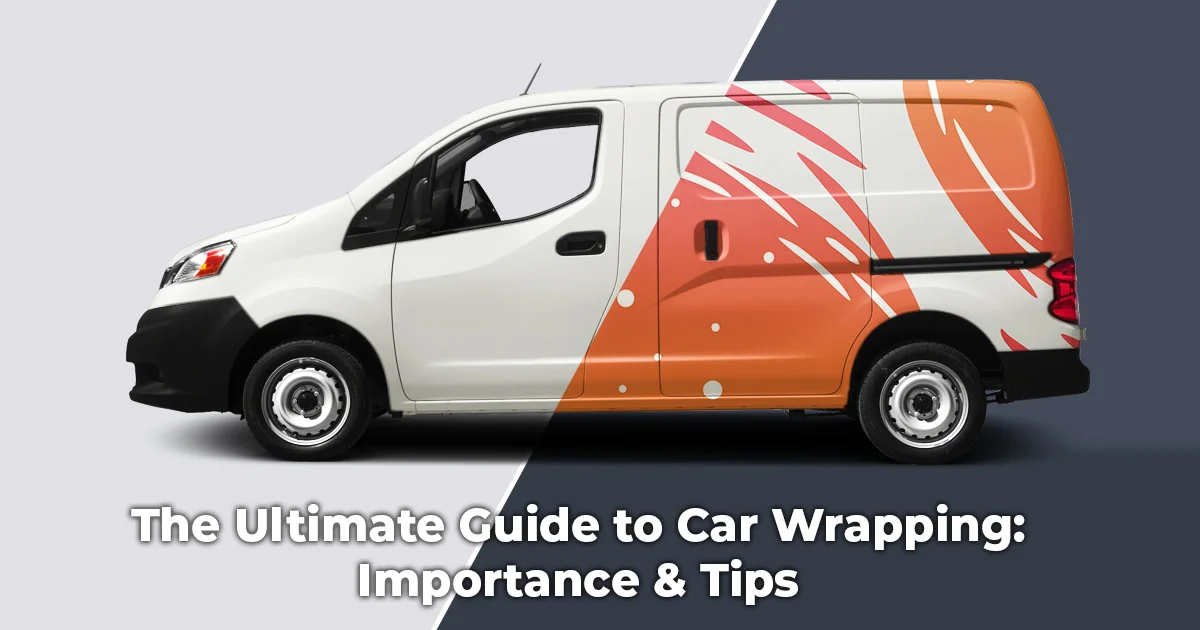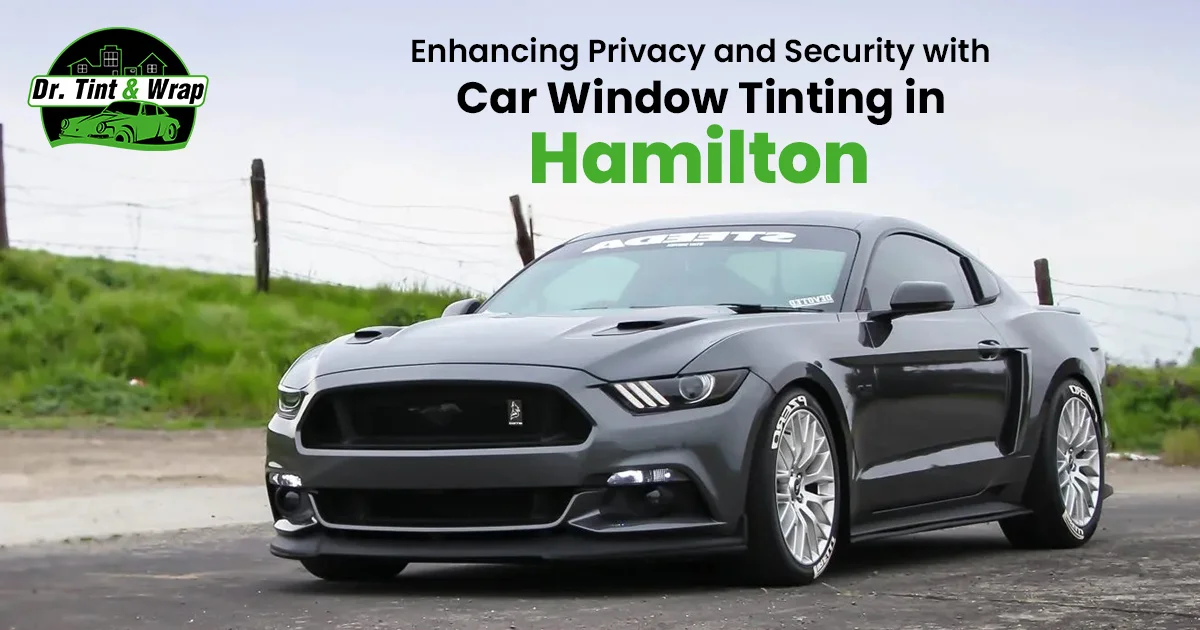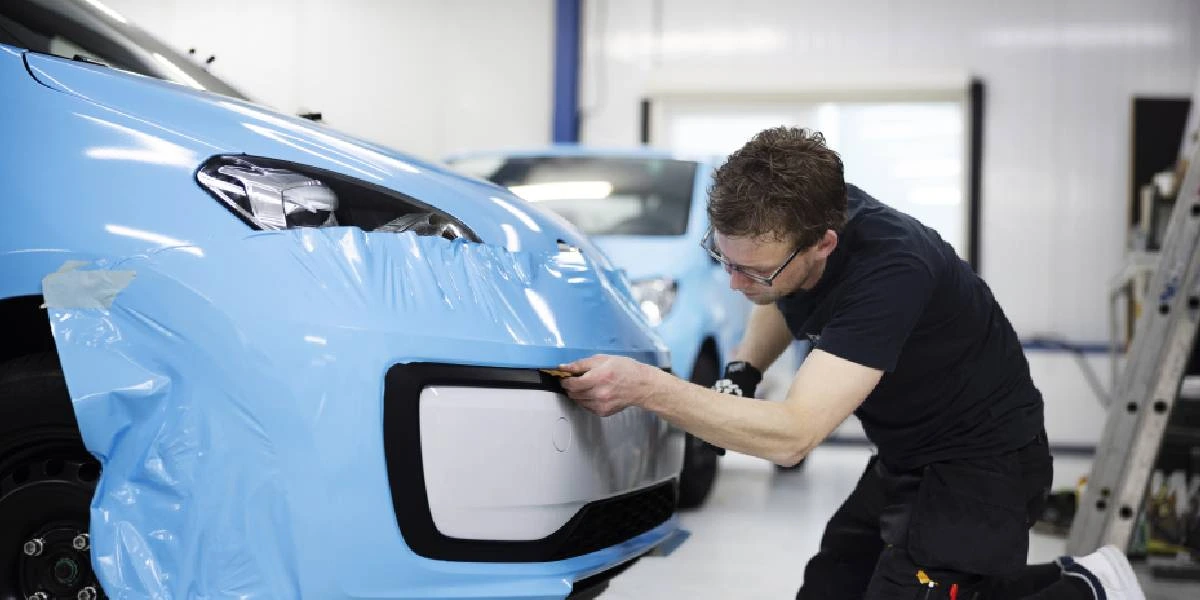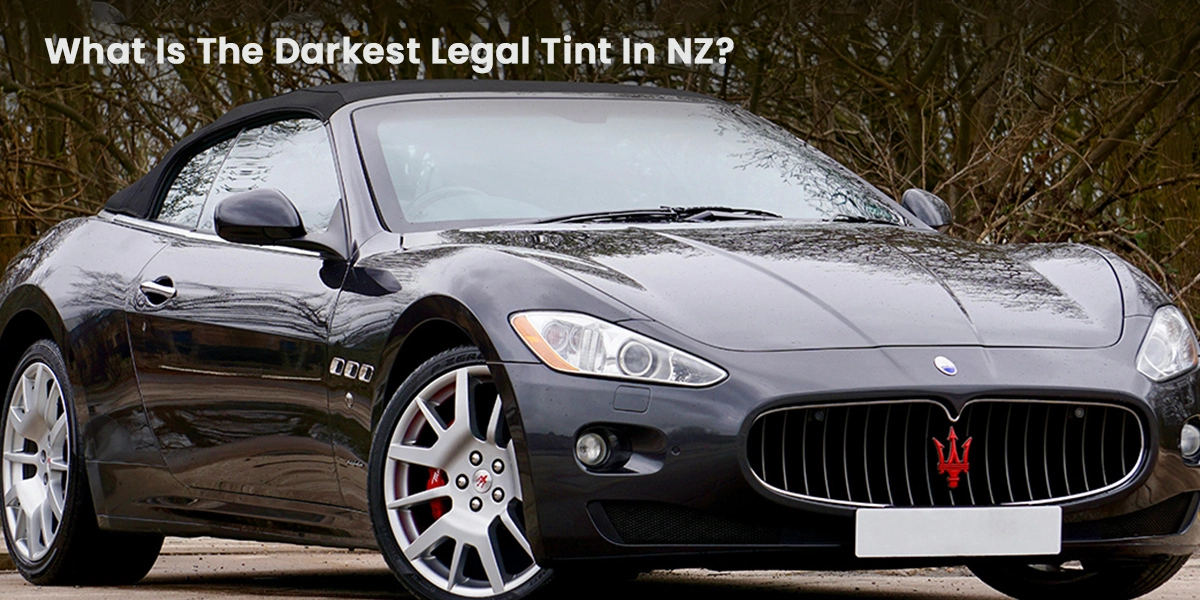
The Ultimate Guide to Car Wrapping: Importance & Tips
25 Apr 2023, By AdminIf you're a car enthusiast looking to give your ride a unique and personalized touch, car wrapping can be an excellent option. Car wrapping is the process of applying a vinyl film onto the surface of a vehicle, completely transforming its appearance. It allows you to change the color, add the finishing, and even add custom graphics or designs to your car, creating a true masterpiece that reflects your style and personality. In this blog post, we will explore the world of car wrapping and how it can elevate your car enthusiast game to the next level.
Importance of Car Wrapping?
Car wrapping has become increasingly popular among car enthusiasts for several compelling reasons,
Customization - Car wrapping allows you to completely transform the appearance of your vehicle. With a wide range of colors, textures, and finishes available, you can create a unique and personalized look that reflects your style and personality. It gives you the opportunity to customize your vehicle without the permanence of a traditional paint job, making it a flexible option for those who like to change up their vehicle's appearance.
Protection - Car wraps provide a layer of protection to your car's original paint. The vinyl material used in car wraps acts as a barrier against minor scratches, chips, and fading from UV rays, helping to preserve the condition of your car's paint and keeping it looking newer for longer. This can be particularly beneficial if you want to maintain your car's resale value or lease a vehicle and want to protect it during the lease period.
Versatility - Car wraps can be used for a variety of purposes beyond just changing the color of your car. They can be used for advertising, business branding, or promoting a cause or event. Car wraps provide a cost-effective and attention-grabbing way to market your business or create awareness for a cause, as they turn your vehicle into a moving billboard that can reach a wide audience.
Reversibility - Unlike traditional paint jobs, car wraps are not permanent and can be easily removed without damaging your car's original paint. This means you can change or remove the wrap whenever you want, allowing for flexibility and versatility in your vehicle's appearance. It also means that if you're planning to sell your car or return a leased vehicle, you can remove the wrap and restore it to its original condition.
Cost-effective - Car wrapping can be a more cost-effective option compared to a traditional paint job, especially for complex designs or multiple color changes. The cost of a car wrap depends on factors such as the size of the vehicle, the type of wrap material used, and the complexity of the design. However, compared to the cost of a full repaint, car wrapping can be more budget-friendly while still providing a high-quality, customizable finish.
Non-permanent - Car wraps are a non-permanent option, which means you can experiment with different looks and styles without committing to a permanent change to your car's appearance. This gives you the freedom to try out different colors, finishes, and designs, and easily revert to the original look if you wish.
Tips for Car Wrapping Enthusiasts
If you're considering car wrapping for your vehicle, here are some tips to keep in mind:
Choose a Professional Installer - Car wrapping is a complex process that requires skill and experience. It's important to choose a professional installer who has a proven track record of quality work. Look for reviews, ask for recommendations, and check their portfolio before making a decision.
Decide on the Type of Wrap - There are different types of car wraps available, including vinyl wraps, color change wraps, and clear wraps. Consider your budget, desired look, and durability requirements when choosing the type of wrap that's best for your car.
Prepare Your Car - Before applying the wrap, make sure your car's surface is clean and free of any dirt, debris, or wax. A clean surface will ensure proper adhesion of the wrap and result in a smooth finish. Also, remove any accessories or trim that may interfere with the wrapping process.
Choose High-Quality Materials - Opt for high-quality vinyl materials for your car wrap. High- quality materials are more durable, resistant to UV rays, and can withstand the elements better, ensuring your wrap will last longer and look better.
Consider Maintenance - Car wraps require regular maintenance to keep them looking their best. Follow the manufacturer's instructions for care and maintenance, which may include avoiding harsh chemicals, hand washing, and avoiding high-pressure car washes.
Be Mindful of Environmental Factors - Extreme temperatures, prolonged exposure to sunlight, and harsh weather conditions can affect the lifespan of your car wrap. Parking your car in shaded areas, using a car cover, and avoiding harsh environmental conditions can help prolong the lifespan of your car wrap.
Avoid DIY Wrapping - Car wrapping is a skilled trade that requires proper training and experience. Attempting to wrap your car yourself without the proper knowledge and tools can result in a subpar finish and damage to your car's paint. It's best to leave car wrapping to the professionals.
Plan for Removal - Car wraps are not permanent and will eventually need to be removed. Plan for the removal process and be prepared for the possibility of minor paint touch-ups after removal. It's important to follow the manufacturer's instructions for proper removal to avoid damaging your car's paint.
Get a Warranty - Look for a professional installer who offers a warranty on their workmanship and the materials used. A warranty can provide you with peace of mind and protection against any potential issues with your car wrap.
Dr. Tint & Wrap is a professional and one of the leading car wrapping service providers in New Zealand. At Dr. Tint & Wrap, we take total care of all the mentioned tips and strictly follow local laws and regulations regarding car wraps, including restrictions on colors, designs, and placement of wraps. Some areas may have specific rules and regulations that need to be followed to avoid any legal issues.

Enhancing Privacy and Security with Car Window Tinting in Hamilton
25 Apr 2023, By AdminCar window tinting has become increasingly popular in Hamilton and for good reason. Apart from its aesthetic appeal, car window tinting offers a range of benefits, including enhanced privacy and security. In this blog, we will explore how car window tinting can provide an added layer of privacy and security for vehicle owners in Hamilton. So, if you're considering tinting your car windows in this vibrant city, read on to discover the advantages and important considerations.
1. Protecting Your Privacy
Car window tinting offers a valuable shield against prying eyes. Whether you're driving through busy streets or parked in a public area, tinted windows can greatly reduce visibility into your vehicle's interior. This added privacy is particularly advantageous when you have valuable belongings or personal items that you'd rather keep out of sight.
2. Deterrence against Theft
The darker tint on car windows can act as a deterrent against potential theft. Tinted windows make it more difficult for thieves to see inside your vehicle and assess if there are any valuable items worth targeting. By concealing the contents of your car, window tinting reduces the likelihood of break-ins and thefts, providing you with an extra layer of security.
3. Protection from Harmful UV Rays
Window tinting not only enhances privacy and security but also offers protection from the harmful effects of UV rays. With New Zealand's high levels of ultraviolet radiation, prolonged exposure to the sun's rays can lead to skin damage, premature aging, and an increased risk of skin cancer. Tinted windows provide a barrier against harmful UV rays, safeguarding you and your passengers while on the road.
4. Enhanced Durability of Interior
Excessive exposure to sunlight can cause fading, cracking, and deterioration of your car's interior surfaces, including the dashboard, seats, and upholstery. Car window tinting helps mitigate this damage by reducing the amount of UV radiation that enters your vehicle. By blocking a significant portion of the sun's rays, tinted windows help preserve the condition and extend the lifespan of your car's interior components.
5. Improved Comfort and Climate Control
Hamilton's weather can be unpredictable, with scorching summers and chilly winters. Car window tinting plays a crucial role in maintaining a comfortable cabin temperature by reducing heat buildup inside your vehicle. Tinted windows minimize the penetration of solar heat, keeping the interior cooler during hot days. Moreover, they also help retain warmth during colder months, promoting a more comfortable driving experience. Car window tinting in Hamilton offers more than just aesthetic appeal. It significantly enhances privacy and security, providing peace of mind for vehicle owners. With the added benefits of protection against harmful UV rays, preservation of interior durability, and improved climate control, tinted windows are an investment worth considering. Dr Tint & Wrap Hamilton is known for delivering unparalleled car window tinting services in Hamilton. Their commitment to excellence, advanced techniques, and premium tinting products set them apart, guaranteeing customers unmatched quality and satisfaction.

Car Wrapping - Factors that affects, Types, Cost and Benefits!
25 Apr 2023, By AdminCar wrapping has become a popular choice for those looking to personalize their vehicle without committing to a permanent paint job. Whether you want to protect your car's original paint, advertise a business, or simply give it a new look, a car wrap is a versatile solution. However, understanding the various aspects, including car wrap cost, is crucial before making a decision. This blog will delve into the factors affecting car wrapping, different types of wraps, the associated costs, and the benefits they bring.
What is Car Wrapping?
Car wrapping involves applying a thin, adhesive vinyl film to the exterior of a vehicle. This film can be of any color or pattern and is customizable to match the car owner's preferences. The wrap is applied by professionals and can cover the entire vehicle or just specific parts, such as the hood, roof, or side mirrors.
Factors That Affect Car Wrapping
Several factors determine the car wrap cost and the overall quality of the wrap:
- Type of Vinyl: The material used for the wrap can significantly impact the price. Premium vinyl wraps like those from 3M, Avery Dennison, or Oracal are more durable and offer better finishes but come at a higher cost. Lower-cost vinyl is available but may not last as long or look as polished.
- Size of the Vehicle: Larger vehicles, such as trucks or SUVs, require more vinyl material, leading to a higher car wrap cost. In contrast, smaller cars like sedans or hatchbacks require less material, making the wrapping process quicker and more affordable.
- Complexity of the Design: Custom designs, intricate patterns, or multiple colors can drive up the car wrap cost. A simple single-color wrap will generally be cheaper than a design that includes logos, gradients, or detailed graphics.
- Surface Condition: The condition of the car's surface affects both the wrapping process and cost. If the vehicle has dents, scratches, or peeling paint, it might require additional prep work before applying the wrap. This can increase the overall price.
- Quality of Installation: The expertise of the installer also plays a role in the final outcome. Professional wrap shops often charge more, but they guarantee a seamless application that can last longer without peeling or bubbling. Choosing a reputable installer can help avoid future issues.
Types of Car Wraps
Understanding the different types of car wraps is important when deciding what suits your needs and budget:
- Gloss Wraps: Gloss wraps mimic the finish of a standard car paint job, giving your vehicle a shiny, polished look. These are popular for those looking to maintain a classic appearance while changing the color of their vehicle.
- Matte Wraps: Matte wraps provide a smooth, non-reflective surface that can give your car a modern and sleek look. They are favored by car enthusiasts who want a unique, sophisticated finish.
- Satin Wraps: Satin wraps fall between gloss and matte finishes, offering a subtle sheen without being overly reflective. This type is perfect for those looking for a more understated style.
- Textured Wraps: Carbon fiber, brushed metal, and chrome wraps are considered textured wraps. They add a unique and dynamic look to specific areas of a vehicle, like the hood or roof. These wraps are often more expensive due to their specialized material.
- Custom Printed Wraps: Custom wraps allow car owners to create unique designs, logos, or images. They are often used for advertising or branding purposes, making vehicles stand out in traffic. The car wrap cost for custom prints can be higher due to the design process and specialized printing.
Car Wrap Cost: How Much Should You Expect to Pay?
The car wrap cost varies depending on the factors mentioned above. Here’s a general breakdown:
- Partial Wraps: Wrapping only parts of the vehicle (like the hood, roof, or mirrors) can range from $200 to $1000. This is a good option if you want to change just a portion of your car's appearance or advertise a logo.
- Full Wraps: A complete wrap that covers the entire vehicle can cost anywhere between $2000 to $6000. For luxury vehicles or more complex designs, the price may go even higher. High-
- Quality Custom Wraps: Custom designs or specialty wraps like chrome or carbon fiber may range from $5000 to $10,000 or more. These are ideal for businesses looking to create a rolling advertisement or for car enthusiasts aiming for a one-of-a-kind look.
While the initial investment may seem high, the benefits of car wrapping often outweigh the costs, especially when compared to a custom paint job that can cost anywhere from $3000 to $20,000.
Benefits of Car Wrapping
- Cost-Effective Customization: Unlike custom paint jobs, wraps offer a more affordable way to achieve a new look for your car. You can switch up styles without the need for permanent changes, making it ideal for those who like to refresh their vehicle’s appearance periodically.
- Paint Protection: A vinyl wrap acts as a protective layer against UV rays, scratches, and minor abrasions. This helps maintain the car's original paint and protects its resale value. When it’s time to sell, you can remove the wrap, revealing the preserved paint underneath.
- Versatility: With an endless array of colors, patterns, and finishes available, car wraps offer unmatched versatility. From changing your vehicle’s color to applying a company logo for branding purposes, the possibilities are limitless.
- Easy Maintenance: Vinyl wraps are easier to clean than paint. A simple wash with soap and water will keep the wrap looking fresh. Unlike traditional paint, you don’t need to worry about polishing or waxing.
- Reversibility: One of the biggest advantages of car wraps is that they are reversible. If you want to revert to your vehicle’s original color or change the design, you can simply remove the wrap without any damage to the paint beneath.
Car wrapping is an excellent way to change your vehicle’s appearance without the long-term commitment and expense of a new paint job. Understanding the factors that affect car wrap cost, the types of wraps available, and the benefits they offer can help you make an informed decision. Whether you want to protect your car's original paint, advertise your business, or just express your personality through a custom design, car wraps provide a flexible and creative solution.
If you're considering a wrap for your vehicle, consult with a reputable installer to get an accurate estimate and explore your options. While the initial car wrap cost may seem like a significant investment, the long-term benefits and the potential to transform your vehicle make it a worthwhile choice.
Book Now

What Is The Darkest Legal Tint In NZ?
25 Apr 2023, By AdminYou’re cruising down a long, smooth highway, taking in the scenic beauty all around you. Suddenly, a sleek black sedan zooms by, catching your eye with its dark, mysterious window tints. The striking contrast between the deep black glass and the shining car body leaves you a bit envious—there’s something undeniably captivating about those dark tints.
Let’s be honest: dark tints give any car a bold, impressive look. Beyond their aesthetic appeal, they also offer practical benefits like protecting passengers from the sun and keeping the interior cool. However, it’s important to remember that there are specific regulations in New Zealand regarding the use of dark tints on vehicles, enforced by the New Zealand Transport Agency and the Ministry of Transport. These regulations must be followed to ensure your car stays road legal.
In this guide, we’ll cover everything you need to know about shaded car window tints, including the legal requirements in New Zealand. We’ll also show you how to have these dark tints installed on your car, legally and expertly.
How to Install the Darkest Legal Tints in NZ
At AutoExpert.co.nz, we are specialists in shaded car window tinting with over 8 years of experience. When it comes to ensuring that your car’s tints are both stylish and compliant with legal standards, AutoExpert is the name you can trust.
To achieve the best and darkest legal tint for your vehicle, visit our studio. Our experts will guide you through the process, helping you choose the perfect tint to transform your car.
Curious about what makes AutoExpert stand out? Learn more about us here, where you'll also find our contact details and location.
Now, let’s dive into the rules and regulations surrounding window tinting in New Zealand and find out what the darkest legal tint is.
Legal Tint NZ: The Reason for Regulations
Dark tints can make a vehicle look sleek and imposing, but there are good reasons for the legal restrictions on their use.
One of the main concerns is visibility. Once windows are heavily tinted, the interior of the vehicle becomes obscured, which could be exploited by individuals with ill intent, making it difficult for law enforcement to see inside the vehicle.
To prevent such issues, New Zealand has established clear rules for the use of dark tints.
These regulations don’t just apply to windows; there are also restrictions on tinting headlights. According to the New Zealand Transport Agency, it’s illegal to apply tint to headlights or lamps, except for decorative purposes.
How Tint Darkness Is Measured
The darkness of shaded car window tints is measured by Visual Light Transmittance (VLT).
VLT refers to the amount of light that can pass through the tinted windows. A higher VLT percentage means more light passes through, indicating a lighter tint, while a lower VLT percentage means less light passes through, indicating a darker tint.
To better understand the legal requirements, let’s take a closer look at the classification of passenger vehicles.
Classification of Passenger Vehicles
The New Zealand Transport Authority categorizes vehicles based on factors like size, power, and seating capacity.
Passenger vehicles are classified into three main categories: MA, MB, and MC.
- MA (Passenger Car): Vehicles with up to 9 seating positions, including the driver.
- MB (Forward Control Passenger Vehicle): Vehicles with 9 seating positions and a steering wheel located in the forward quarter of the vehicle’s length.
- MC (Off-Road Passenger Vehicle): Vehicles designed for off-road use, also with 9 seating positions.
Other classifications include MD (light omnibus), ME (heavy omnibus), goods vehicles, and trailers, each with further sub-categories based on weight, capacity, and usage.
Checking Tint Compliance
The most accurate way to check if your window tint complies with NZ laws is by using a calibrated VLT meter, available at our studio. This device measures the exact VLT of the tint, ensuring it fully complies with the regulations set by the New Zealand Transport Agency and the Ministry of Transport.
We also recommend placing a sticker on the windshield that indicates the VLT level of the installed tints, which can help speed up inspections. While not mandatory, this sticker can make the process smoother.
For a more detailed understanding of legal tinting regulations, you can visit the Ministry of Transport’s website: Land Transport Rule: Glazing, Windscreen Wipe and Wash, and Mirrors Rule 1999.
Dark tints on car windows are not only stylish but also provide privacy and protection from the sun. However, they can also be misused, which is why strict regulations are in place.
At Dr. Tint, we have experience in installing top-quality dark tints that are both stylish and fully compliant with all legal requirements.
Consult with us today and give your car the perfect makeover with our expert tinting services!
Book Now
